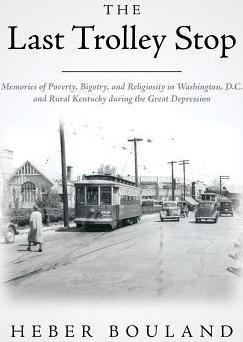The Last Trolley Stop: Memories of Poverty, Bigotry, and Religiosity in Washington, D.C. and Rural Kentucky during the Great Depression

The Last Trolley Stop: Memories of Poverty, Bigotry, and Religiosity in Washington, D.C. and Rural Kentucky during the Great Depression
The Last Trolley Stop, Heber Bouland's eyewitness account of the Great Depression, gives a candid and honest examination of a pivotal time in American history. His narrative has humor, the naughty, and the tragic.
When President Roosevelt was inaugurated for the first time, Heber Bouland was a few weeks shy of his fifth birthday and too young to understand the many effects of the Great Depression that surrounded him.
Bouland lived with his family in Takoma Park, at the northern edge of Washington, DC, a neighborhood of contradictions. A US senator lived there in a fine house. White homebuyers signed agreements not to resell to "coloreds." Seventh-day Adventists, a nationwide religious minority, were dominant there. Yet this privileged, segregated community also included two small poverty-stricken ghettos inhabited by African-Americans-the very "darkies" the whites were so desperate to avoid.
Visits to his uncle's small tobacco farm in western Kentucky, where he witnessed toddlers laboring in tobacco fields, gave him a rural perspective of the depression.
Bouland saw firsthand the devastating effects of depression era bigotry, religious hypocrisy, and poverty-effects he accepted as a child, but that appalled him as an adult.
PRP: 100.36 Lei
Acesta este Pretul Recomandat de Producator. Pretul de vanzare al produsului este afisat mai jos.
90.32Lei
90.32Lei
100.36 LeiLivrare in 2-4 saptamani
Descrierea produsului
The Last Trolley Stop, Heber Bouland's eyewitness account of the Great Depression, gives a candid and honest examination of a pivotal time in American history. His narrative has humor, the naughty, and the tragic.
When President Roosevelt was inaugurated for the first time, Heber Bouland was a few weeks shy of his fifth birthday and too young to understand the many effects of the Great Depression that surrounded him.
Bouland lived with his family in Takoma Park, at the northern edge of Washington, DC, a neighborhood of contradictions. A US senator lived there in a fine house. White homebuyers signed agreements not to resell to "coloreds." Seventh-day Adventists, a nationwide religious minority, were dominant there. Yet this privileged, segregated community also included two small poverty-stricken ghettos inhabited by African-Americans-the very "darkies" the whites were so desperate to avoid.
Visits to his uncle's small tobacco farm in western Kentucky, where he witnessed toddlers laboring in tobacco fields, gave him a rural perspective of the depression.
Bouland saw firsthand the devastating effects of depression era bigotry, religious hypocrisy, and poverty-effects he accepted as a child, but that appalled him as an adult.
Detaliile produsului








